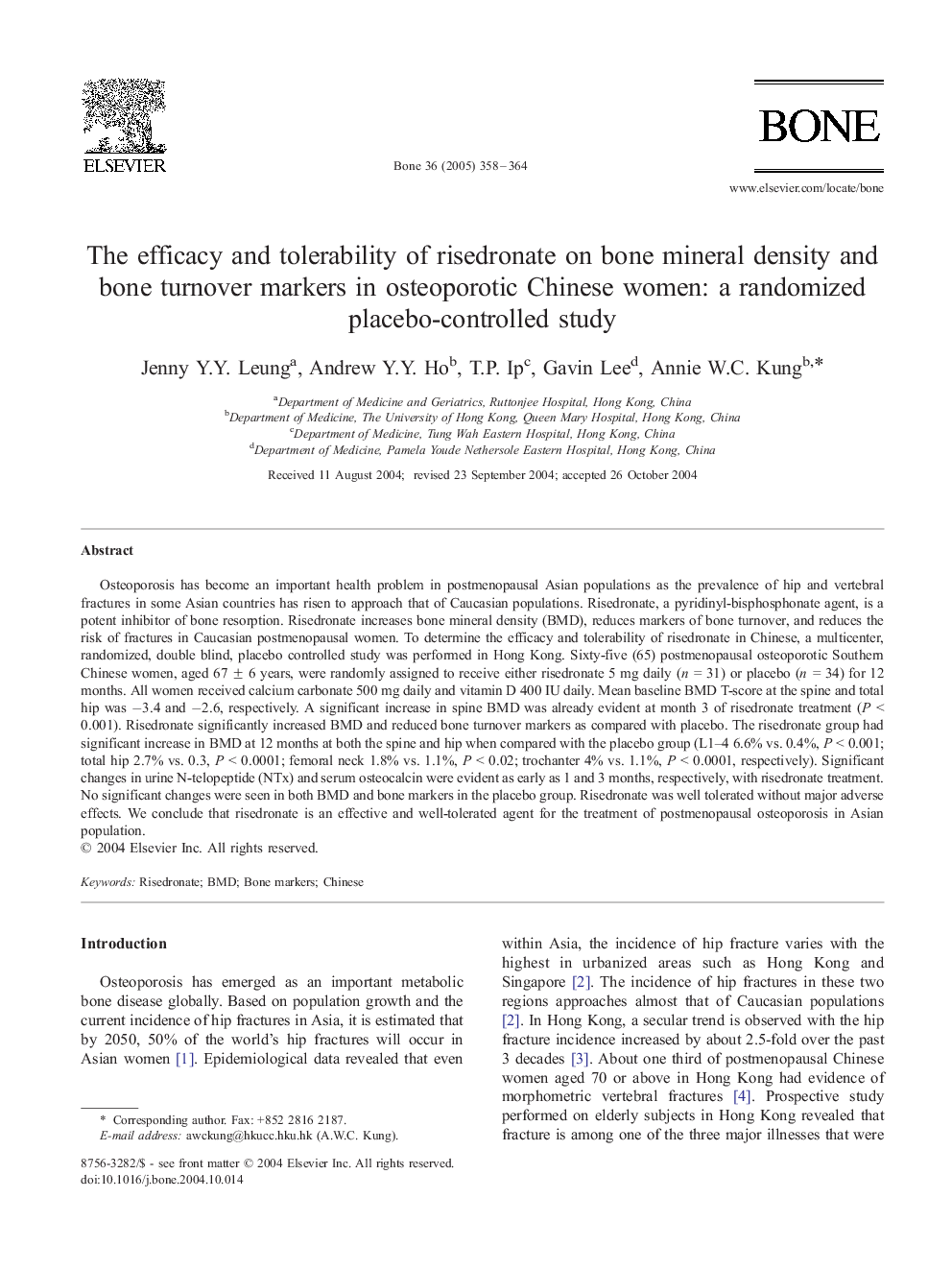| کد مقاله | کد نشریه | سال انتشار | مقاله انگلیسی | نسخه تمام متن |
|---|---|---|---|---|
| 9105153 | 1153406 | 2005 | 7 صفحه PDF | دانلود رایگان |
عنوان انگلیسی مقاله ISI
The efficacy and tolerability of risedronate on bone mineral density and bone turnover markers in osteoporotic Chinese women: a randomized placebo-controlled study
دانلود مقاله + سفارش ترجمه
دانلود مقاله ISI انگلیسی
رایگان برای ایرانیان
موضوعات مرتبط
علوم زیستی و بیوفناوری
بیوشیمی، ژنتیک و زیست شناسی مولکولی
زیست شناسی تکاملی
پیش نمایش صفحه اول مقاله

چکیده انگلیسی
Osteoporosis has become an important health problem in postmenopausal Asian populations as the prevalence of hip and vertebral fractures in some Asian countries has risen to approach that of Caucasian populations. Risedronate, a pyridinyl-bisphosphonate agent, is a potent inhibitor of bone resorption. Risedronate increases bone mineral density (BMD), reduces markers of bone turnover, and reduces the risk of fractures in Caucasian postmenopausal women. To determine the efficacy and tolerability of risedronate in Chinese, a multicenter, randomized, double blind, placebo controlled study was performed in Hong Kong. Sixty-five (65) postmenopausal osteoporotic Southern Chinese women, aged 67 ± 6 years, were randomly assigned to receive either risedronate 5 mg daily (n = 31) or placebo (n = 34) for 12 months. All women received calcium carbonate 500 mg daily and vitamin D 400 IU daily. Mean baseline BMD T-score at the spine and total hip was â3.4 and â2.6, respectively. A significant increase in spine BMD was already evident at month 3 of risedronate treatment (P < 0.001). Risedronate significantly increased BMD and reduced bone turnover markers as compared with placebo. The risedronate group had significant increase in BMD at 12 months at both the spine and hip when compared with the placebo group (L1-4 6.6% vs. 0.4%, P < 0.001; total hip 2.7% vs. 0.3, P < 0.0001; femoral neck 1.8% vs. 1.1%, P < 0.02; trochanter 4% vs. 1.1%, P < 0.0001, respectively). Significant changes in urine N-telopeptide (NTx) and serum osteocalcin were evident as early as 1 and 3 months, respectively, with risedronate treatment. No significant changes were seen in both BMD and bone markers in the placebo group. Risedronate was well tolerated without major adverse effects. We conclude that risedronate is an effective and well-tolerated agent for the treatment of postmenopausal osteoporosis in Asian population.
ناشر
Database: Elsevier - ScienceDirect (ساینس دایرکت)
Journal: Bone - Volume 36, Issue 2, February 2005, Pages 358-364
Journal: Bone - Volume 36, Issue 2, February 2005, Pages 358-364
نویسندگان
Jenny Y.Y. Leung, Andrew Y.Y. Ho, T.P. Ip, Gavin Lee, Annie W.C. Kung,